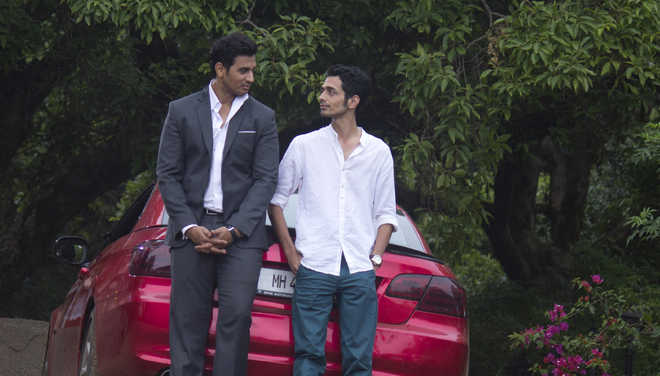
Tender revelations: Sudhanshu Saria’s Loev is about friendship and love
Swati Rai
Platonic, romantic or passionate, love has been represented in many different ways on the 70mm screen. This censor-proof love, however, required a man and a woman in the story. However, the moment it came to express the same-gender relationships, it became a taboo.
On screen, gay characters ranged from heroine’s best friend to becoming the butt of sexist wisecracks and crass comedy fillers on television. Then, there have been stereotypical trappings in films like Fashion (2008) where characters of gay designers had exaggerated mannerisms while Dostana, which was released the same year, had the two male protagonists suggesting slapstick comical male love.
The narrative, however, seems to be getting more nuanced as is evident from many new movies ranging from Pan Nalin’s Angry Indian Goddesses (2015), Shakun Batra’s Kapoor & Sons (Since 1921)(2016), Hansal Mehta’s Aligarh (2016) to the more recent films on internet like Sudhanshu Saria’s Loev and Roopa Rao’s The ‘Other’ Love Story.
Attempts to look beyond the garish parodying of this community have been evident in films like Deepa Mehta’s Fire (1996), starring Shabana Azmi and Nandita Das, Karan Razdan’s Girlfriend (2004), starring Amrita Arora and Isha Koppikar, and, the recent, Kenny Deori Basumatary’s Assamese film, Local Kung Fu 2, which portrayed a gay protagonist. More often than not, such attempts to break the glass ceiling have, in the past, met with opposition from society as well as the censor board.
Reasons such as gay love being ‘against the Indian culture’ have been cited to stop or delay the screening of such films. The digital space, however, has been quick to grab this new viewership.
The digital revolution freedom has seen an upswing in sensitive and sensitised same-gender love stories. A new 90-minute Indian film that debuted on Netfix recently, Loev, is about the tender revelations of friendship and love and is the cinematic traversing of the forbidden zone. The movie saw ‘sold out’ shows in the festival circuit of the US, Mumbai and Kerala.
Sudhanshu Saria shares, “Outlets like Netflix allow us to tell our stories without worrying about whether it will sell enough popcorn and cola. We received emotional notes thanking us for the dignity with which we were telling our story and presenting these characters.”
This movement has been buttressed by big players in the movie production business making inroads into digital production. With production houses like Y Films, an off shoot of Yashraj films, Balaji’s ALT Balaji and Dharma’s Dharma 2.0 entering the scene, there’s no stopping the digital medium. The movement may well be supported by the rise of film festivals such as Kashish Mumbai International Queer Film Festival, which in the current year has 147 movies from all around 45 countries screening at the festival.
Festival director, Sridhar Rangayan’s The Pink Mirror (Gulabi Aaina), based on the life of a drag queen, found a release on Netflix last year after a decade of its release.
According to him, “Gone are the stereotypical caricatures of gay men in Hindi films, and of homophobic bashing of the LGBT persons in films. The winning of National Awards by films like I am Not He, She (Naanu Avanalla, Avalu), Breaking Free and Daarvatha meant that Indian queer cinema has arrived.
Space for the other
Bomgay (1996): Comprising six segments based on poems written by Raj Rao, Riyad Vinci Wadia’s and Jangu Sethna’s anthology of short films starred Rahul Bose and Kushal Punjabi
Mango Soufflé (2002): Mahesh Dattani’s adaptation from self composed play ‘On a Muggy Night in Mumbai’ had Atul Kulkarni and Rinkie Khanna.
My Brother Nikhil (2005): In the backdrop of a swimming champion announcing his AIDS affliction, Onir’s interpretation of a gay relationship has been very subtle.
All About Section 377 (2016): In Amit Khanna’s web series, a straight guy lives with two gay guys. The film is aimed at educating the masses on the struggles of the LGBT community in India.
The ‘Other’ Love Story (2016): Roopa Rao’s web series is more than just a lesbian love story.
Romil and Jugal (2017): Nupur Asthana’s web series shows her interpretation of Shakespeare’s Romeo and Juliet.
Velutha Rathrikal (White Nights): Razi Muhammed’s critically acclaimed Malayalamfilm tells the story of a village woman in love with both a woman and a man.



























